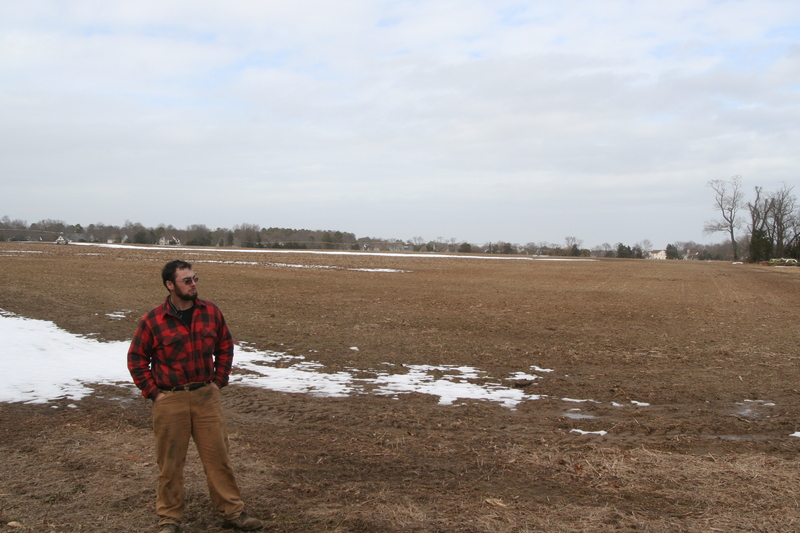Local family loses lease on farmland

Farming is in Nelson Warren’s blood. When other longtime Wolfe Neck-area farming neighbors – Dodds, Futchers, Hollands, and Masseys – sold land to developers near the Warren family’s Rustic Acres farm off Holland Glade Road, the Warrens did not sell.
Even in 1997, when 18 Warren family members wanted to sell the farm to the state, only four – Nelson, 28; his 19-year-old brother Nathaniel; their mother, Mary Ann, 54; and her brother, Victor, 56 – wanted to continue farming.
With the four outvoted, the farm was sold to the state, but Nelson leased the land back from the state and continued farming – until last year.
That's when Jamie Stafford, a farmer based in Denton, Md., outbid them, and the Warrens lost the lease on what had previously been their land.
“I don’t bear Jamie Stafford any grudge,” Warren said. He said he knew lease rules had changed, but he wonders why in-state farmers weren’t given consideration in the leasing program.
Greg Abbott, a Department of Natural Resources and Environmental Control, Division of Parks & Recreation farmland lease program administrator, said Stafford was awarded leases because he scored high on bid evaluations. He said statewide there were 51 bids on 21 properties.
“The key factor to remember is that the farms are state-owned, publicly-held properties that were purchased at full market value. The Warren family lost any exclusive rights to the property when they sold them to the state,” Abbott said.
Prior to 1998, leases were for 5 years. Leases are now for 10 years, beginning January 2014 and ending Dec. 31, 2023.
Tenants pay the state an annual rental fee for years one through five and for each year, six through 10, tenants pay a fixed 5 percent more than they paid for the first five years.
Under the old lease farmers were required to pay for one year in advance, Warren said.
Warren said he couldn’t come close to Stafford’s bid per acre. Stafford said his bid per acre averaged $165 to $190; Warren said he bid $83 per acre.
“I till ground in seven counties, I’m constantly bidding on ground,” Stafford said in a recent interview.
He said he plans to grow corn and beans on the land previously leased by the Warrens.
Warrens downsize but keep farming
Warren said he’ll downsize his farming operation; he has already reduced his livestock from around 55 head to 11.
“I’m milking 11 cows, and I try to get to them twice a day, 6 a.m. and 6 p.m.,” he said.
He said no other type of farming is more labor intensive than dairy. “I’m the last dairy farm surviving in the state that does it all.” He said his brother, a Delaware Technical & Community College student, also helps, juggling farm work and a school schedule.
The Warren’s Rehoboth dairy milk-processing facility occupies about half of the Rustic Acres Farm Market building. Everything except homogenizing – dispersing milk fat uniformly throughout milk to prevent separation – is done there.
The facility has a 50-gallon stainless steel pasteurization tank, a whole milk holding tank and an ancient cream centrifuge that Warren keeps spinning by cobbling together parts it requires.
“I’ve found ball bearings for it that’ll work, but they weren’t built for it. God forbid I’ll ever need a drive belt for the motor,” he said.
Milk production quality control and bottling is stringent, Warren said, and so is accurate record keeping and retention.
There’s a small lab where Warren tests for antibiotics in milk. The facility also keeps pasteurization records containing the length of time and temperature each batch of milk is heated and cooled. Pasteurization kills potentially harmful microorganisms.
This year, Stafford will till a field adjacent to The Glade, a community of upscale homes. The Holland family farmed the fields that became The Glade until the mid-1980s.
The Warrens tilled land adjacent to the community for decades prior to its development. Warren said he has mixed feelings about The Glade because he knows some of its homeowners would just as soon no one farmed nearby.
But, he said there are also residents who have become regular customers, buying the market’s dairy products, produce, ice cream, and locally produced beef, pork and eggs.
Without the land he previously leased, he will grow more produce for the farm market, increase the market's visibility using more advertising, and introduce his own new products.
“I’m also looking into making frozen yogurt. The leftover skim milk we have would be perfect for it. I think I have an eggnog recipe that I can make work, too. It should be pretty good,” he said, about a recipe he found using whole milk that has not been homogenized.
He said cabbage grew and sold well last year, and he’s planning to grow another crop this season.
Nelson Warren said the state couldn’t have completed the Junction and Breakwater trail had his family not sold their land. He said the sale also made it possible for his family to continue farming. Warren said if the state accepts his offer he wants to continue mowing the buffer strip between the fields and trail.
“I’ll probably have a farm sale in the fall,” he said, about plans to sell tractors, a combine, trucks, irrigation equipment and other gear he won’t need having lost the lease on land his family once owned.
New leasing criteria establishes rating score
State leases for farmland are awarded based on criteria other than money per acre bids. Greg Abbott, Division of Parks & Recreation farmland lease program administrator, said 20 percent of the score is based on the applicant's knowledge and experience farming leased property; 10 percent on use of products or services that are provided by agricultural businesses which are certified best management practices, and surrounding state’s standards; 10 percent on additional services provided for leased property; and 60 percent on monetary bid per acre.
Until last year, bids had been awarded based solely on money, Abbott said. The process changed as a result of implementing new rating criteria that benefited longtime farming families, he said, adding the state has received favorable comments about the inclusion of factors other that price alone.
“In one case, a Delaware farmer was awarded the lease but did not have the highest monetary price per acre. The other criteria – experience, best practices and other services – outscored bids with a higher price per acre, but who had less farming experience.” Abbott said.
He said a Delaware Century Farmer, one whose family had worked land for at least 100 years, had not previously tilled state park-owned land.
Abbott said several Delaware farmers placed bids in the process set up to allow farmers an opportunity to bid on lands in a fair, transparent and competitive program.
“What a farmer is able to bid depends on their current financial situation, current and past business practices and willingness to compete in the open market for the right to farm these lands,” he said.
He said the process is no different than state procurement for construction, supplies, materials and contractual services.
“All requests for proposals are made available to anyone, regardless of where they live, through the www.bids.delaware.gov process, and are awarded based on the best proposal received.
“The lease is based on a template used by state agencies that I believe was drafted by the Delaware Attorney General’s Office,” Abbott said.
Leased land may be used for producing agricultural commodities, including, but not limited to grain, vegetable and forage crops, and pasture.
Tenants are also required to have nutrient management and conservation plans and take measures to manage, control and eradicate noxious weeds. Subleasing is prohibited.
























































